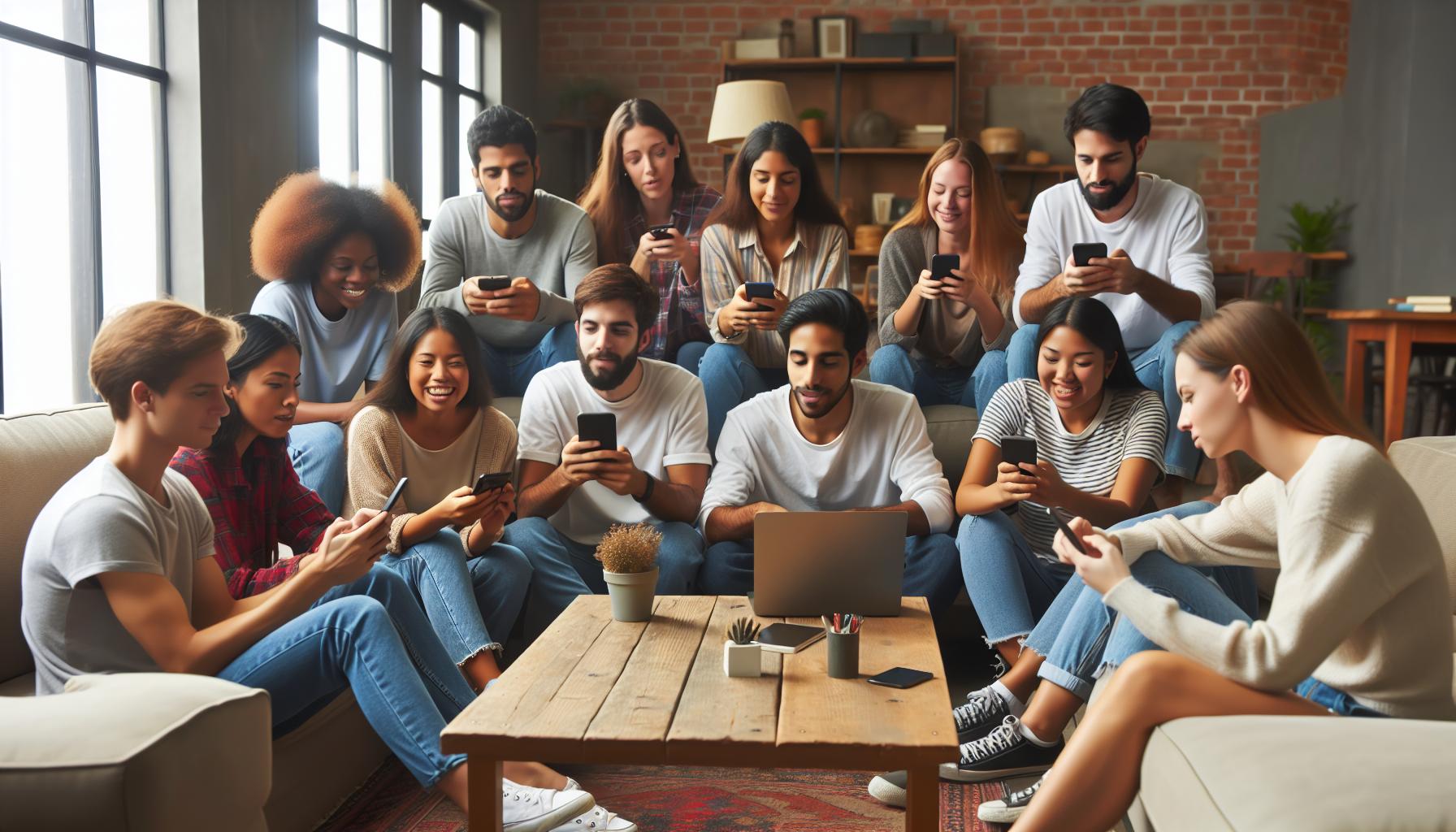Social media has transformed the way people connect and communicate, creating a digital landscape that’s both vibrant and complex. With billions of users worldwide, platforms like Facebook, Twitter, and Instagram have become integral to daily life, offering a space for sharing ideas, news, and personal milestones. Yet, the impact of social media sparks intense debate, raising questions about its true value.
On one hand, it fosters community and provides a voice for the marginalized. On the other hand, concerns about mental health, misinformation, and privacy loom large. As individuals navigate this digital realm, understanding whether social media is beneficial or harmful becomes crucial. This exploration delves into the multifaceted effects of social media, examining both its positive contributions and potential pitfalls.
Key Takeaways
- Dual Impact: Social media has both positive and negative effects, influencing communication, community building, and mental health.
- Enhanced Connectivity: It connects people globally, facilitating instant communication and the sharing of experiences across diverse cultures.
- Awareness Promotion: Social media amplifies critical social issues and movements, providing a platform for marginalized voices to be heard and rally support.
- Mental Health Risks: Prolonged usage can lead to anxiety, depression, and feelings of isolation, often exacerbated by comparisons and cyberbullying.
- Misinformation Challenge: Rapid dissemination of false information can mislead individuals and erode public trust in credible sources.
- Healthy Usage Strategies: Practicing mindful social media use, setting boundaries, and engaging in digital literacy can mitigate its harmful effects while maximizing benefits.
Is Social Media Beneficial or Harmful
Social media profoundly impacts communication and connection, shaping how individuals interact in today’s digital environment. Platforms like Facebook, Twitter, and Instagram connect billions of users, offering tools for sharing information, ideas, and experiences.
Benefits of social media include:
- Enhanced Communication: Users share thoughts and insights in real time, fostering dialogue across distances.
- Community Building: Social media promotes the formation of online communities centered around shared interests, allowing individuals to connect despite geographical barriers.
- Amplification of Voices: Marginalized groups find platforms to share their stories, mobilize for change, and raise awareness on critical issues.
- Access to Information: Users receive instant updates regarding news, trends, and events, facilitating informed decision-making.
Despite its advantages, social media presents several drawbacks:
- Mental Health Concerns: Prolonged use can lead to anxiety, depression, and feelings of isolation, particularly among young users.
- Misinformation Spread: The rapid distribution of false information can mislead public perception and cause societal harm.
- Privacy Issues: Data breaches and unauthorized use of personal information expose users to potential risks.
- Addiction Potential: Excessive engagement with social media can lead to addictive behaviors, impacting daily life and responsibilities.
Understanding these diverse impacts allows users to navigate social media thoughtfully, balancing its benefits against the risks involved.
Benefits Of Social Media

Social media offers several positive impacts in today’s connected world, enhancing communication and providing access to resources. Below are key benefits that illustrate its importance.
Connecting People Globally
Connecting people globally is one of social media’s core advantages. Individuals can communicate instantly across continents, breaking down geographical barriers. Platforms like Facebook, Twitter, and WhatsApp allow users to share experiences and foster friendships, leading to a more interconnected global community. Support groups for various interests or challenges thrive online, providing emotional support and shared knowledge.
Access To Information
Access to information through social media is unparalleled. Users can acquire news updates, educational content, and expert opinions in real-time. Various platforms aggregate diverse sources, enabling users to engage with multiple viewpoints. This democratization of information empowers users to stay informed and make educated decisions on various topics, from health to politics.
Promoting Awareness
Promoting awareness is another significant benefit of social media. It amplifies important social causes, driving movements that capture public attention. Through hashtags and viral campaigns, issues like climate change, racial equality, and mental health can gain traction. These platforms afford marginalized voices opportunities to highlight their struggles and achievements, fostering understanding and encouraging action.
Harms Of Social Media

Social media’s impact includes significant harms that require attention. The growing use of these platforms is linked to several negative consequences on individual and societal levels.
Mental Health Issues
Mental health issues arise frequently with social media use. Studies indicate increased rates of anxiety and depression among users, particularly young people. Users experience pressure from constant comparisons to curated lifestyles. Additionally, social media may disrupt sleep patterns due to excessive screen time. Reports show that heightened feelings of isolation can result from limited offline interactions, even amidst online connectivity.
Spread Of Misinformation
The spread of misinformation poses a major concern across social media platforms. Algorithms often prioritize sensational content, amplifying false information. Research indicates that incorrect health information can lead to harmful choices, especially during crises like the COVID-19 pandemic. Users frequently encounter misleading political narratives that skew public opinion. This environment fosters distrust in credible sources, complicating efforts to combat false information.
Cyberbullying
Cyberbullying represents a significant threat associated with social media usage. Victims often face harassment and intimidation through online channels, impacting their mental well-being. Statistics reveal that approximately 37% of young people experience some form of cyberbullying. The anonymity of social media encourages aggressive behavior, with perpetrators feeling less accountable for their actions. Such incidents can lead to severe emotional distress, including depression and in extreme cases, suicidal thoughts among victims.
Balancing The Pros And Cons

Social media provides various advantages alongside its risks. Understanding how to maximize the benefits while minimizing the harms is essential for users.
Healthy Social Media Usage
Healthy social media usage involves setting boundaries and being mindful of interactions. Users should focus on engaging with content that enhances their well-being. Regular breaks from social media reduce anxiety and improve mental health. Limiting exposure to negative or uninspiring content helps maintain a positive experience. Curating friend lists and following accounts that promote positivity fosters a supportive online environment. Practicing self-reflection on one’s social media behavior can also encourage healthier habits.
Strategies For Mitigating Risks
Mitigating risks associated with social media requires proactive measures. Implementing privacy settings can protect personal information and limit unwanted contact. Users should verify information from multiple credible sources to combat misinformation. Engaging in digital literacy education equips users with skills to identify misleading content. Reporting and blocking harmful accounts reduce exposure to cyberbullying. Establishing a dedicated time for social media use can prevent addiction and help maintain a balanced life. Open dialogue about online experiences encourages supportive conversations and builds resilience against negative interactions.
Staying Educated And Adaptable
Social media holds a dual nature that can either enhance or hinder individual well-being. By understanding its potential benefits and drawbacks, users can make informed choices about their online presence. Embracing the positive aspects of connection and awareness while being mindful of mental health and privacy concerns is crucial.
With intentional usage and a proactive approach to managing online interactions, individuals can cultivate a healthier relationship with social media. This balance not only promotes personal growth but also fosters a more supportive and informed digital community. As the landscape continues to evolve, staying educated and adaptable will empower users to navigate social media effectively.